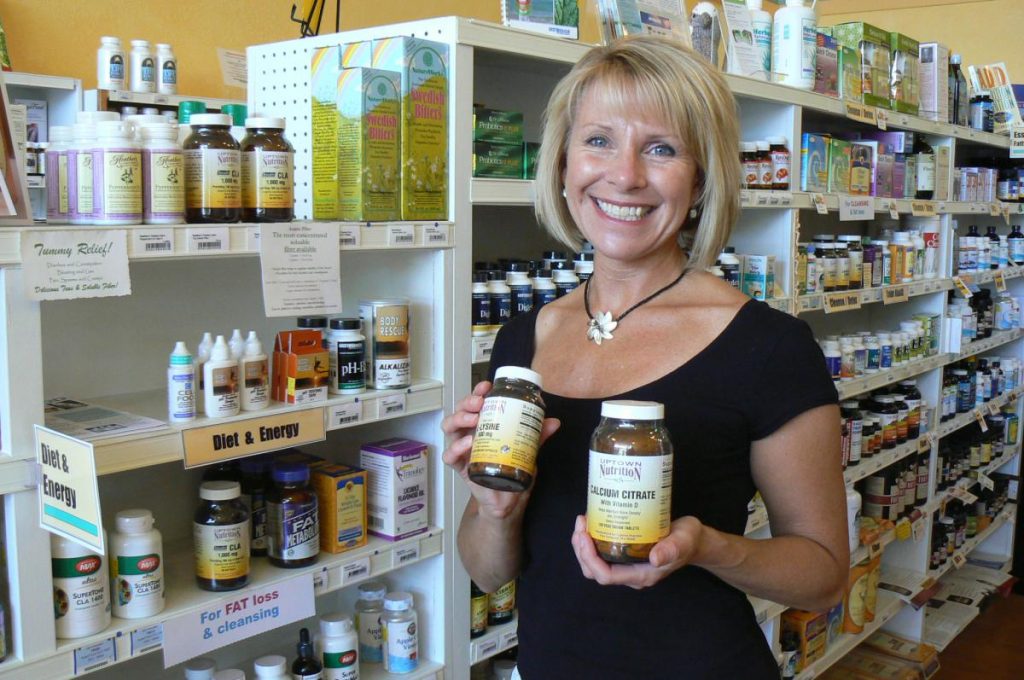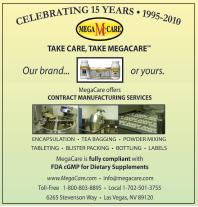For the last few years, consumers have been reevaluating their buying habits, doing their research and looking for more value for their dollars. As a result, private label brands have seen an upswing in sales because of the value they offer. Karl Halpert, president and CEO of Private Label Select, Ranchos de Taos, NM, says, “Stores offering brand name quality at 20% to 30% below brandname pricing presents a powerful value to the consumer. We see this as a stable trend in good times as well as bad. A strong private label program also encourages store loyalty with the customer.”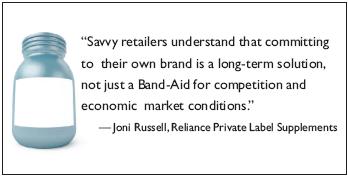
Also, says Joni Russell, director of sales at Reliance Private Label Supplements, Somerset, NJ, “The economic downturn has been an encouragement for retailers to reexamine their business models, and savvy retailers understand that committing to their own brand is a long-term solution, not just a Band-Aid, to both their competition and the economic market conditions.”
However, committing to a private label line can be an overwhelming and 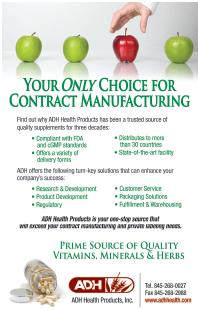 daunting prospect. WholeFoods asked private label experts what they feel are the most important points to keep in mind.
daunting prospect. WholeFoods asked private label experts what they feel are the most important points to keep in mind.
A: Appropriate Products
One of the biggest mistakes a retailer can make is to not take enough time to select the most appropriate products for their line. According to Sunil Kohli, COO of Health Plus, Inc., Chino, CA, “Retailers need to truly understand their specific loyal consumer niche. Is it baby boomers in the south? Is it more athletic and younger people? Is the store located in suburban towns with many young families? Each core group of customers has needs in common.”
With all of the unique and important products the natural products industry has to offer, you may be wondering where to start in terms of with which type of product to start your line. Typically, vitamins and supplements seem to be the safest routes, as opposed to grocery or health and beauty care (HBC) products.
Muhammed Khalid, president of Pro-X Nutraceuticals, Irvine, CA, notes,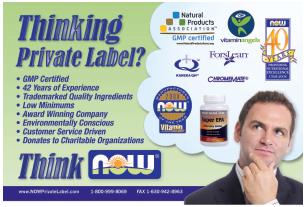 “It depends on each retailer and its demographics as to which products to launch, whether health and beauty or food items.” Functional foods, he adds, are another growth category in the private label sector.
“It depends on each retailer and its demographics as to which products to launch, whether health and beauty or food items.” Functional foods, he adds, are another growth category in the private label sector.
According to Lynn Betz, president and co-founder of Sensibility Soaps, Inc., Beaver Falls, PA, “Health and beauty are more risky because of the typically lower volume of sales in those categories and some consumer loyalty to national brands.”
Another issue are the minimums required. Russell adds, “When buying HBC and food, most often case quantities are required for purchasing and independents are not comfortable will all their cash being tied up in one  brand’s inventory.” Lip balm or hand cream may be a more reasonable and affordable introduction into offering HBC products, as opposed to full hair care or anti-aging regimens.
brand’s inventory.” Lip balm or hand cream may be a more reasonable and affordable introduction into offering HBC products, as opposed to full hair care or anti-aging regimens.
Supplements, on the other hand, are very expansive and high-visibility items. In addition, says Steve Shriver, founder of Eco Lips, based in Cedar Rapids, IA, “Supplements are a much larger category, so it makes sense to start there. The demand for
|
Retailer Q & As
Suzy Carroll, president of Uptown Nutrition, Port Townsend, WA, shared with WholeFoods some info about her store’s private label line. Q: Why did you choose to begin a private label line? Q: What did your private label line start with (supplements, foods, health and beauty) and why? Q: What do you think about your private label manufacturer? Q: How have your private label sales fared in this tough economy? Q: What steps have you taken to help customers trust in your private label products? Click here for more interviews with retailers and to share information about your own private label line! |
supplements has created such a competitive environment that minimums and pricing have become extremely low. This has given retailers the opportunity to reduce inventory costs while sharing the added savings with consumers, driving more sales.”
Supplements generally have a higher profit margin than any other category. Peter Sokoloski, private label manager at NOW Private Label, Bloomingdale, IL, notes, “This means that a retailer can start off slow and ramp up as business increases.”
Claims on supplements tend to be more consistent than the language on health and beauty products, which is still a bit up in the air (think “natural” and “organic”). For example, Halpert says it’s easy for customers to compare, say, two vitamin C supplement products, whereas the standards for HBC still allow for great disparity between two skin care products labeled as “natural.”
However, if you have the means, don’t limit yourself to supplements alone. Shriver says, “Retailers would absolutely benefit from private labeling other categories. Consumers are willing, now more than ever, to give store brands a try. The more products you can get into a person’s home with your name on them, the more relevant your store becomes in their everyday lives.”
But buying too much of a product can be detrimental as well. Kohli says, “Review your core consumer group and see which products have consistent high velocity. Do not go whole hog, but realize you can and will always add new products to your store brand.”
In addition, Halpert suggests that retailers would benefit greatly from carrying fast-moving private label products that many shoppers buy on impulse, such as bottled water and lip balm. These items serve an additional promotional purpose, as every time a shopper uses the item they are reminded of your store.
Kohli also recommends making use of a local promotional products distributor. Pick giveaways that fit with what natural shoppers might want and that promote your line, such as supplement/pill organizers or reusable beverage bottles or smoothie shakers.
B: Brand Yourself
Creating a private label line is more than just offering another option for customers. It is presenting a whole new brand to which customers can open their eyes and from which they can benefit—meaning, it involves a lot more than just a lower price tag.
Your brand also is identified by its appearance, which is representative of your store as a whole. Many consumers associate quality with the appearance of a label, so don’t skimp on the design process. Kohli says, “Appearance on the shelf is a huge factor. Make sure your logo will reproduce well. If it is too complex, consider revising your logo with a professional graphic artist. Color balance is key in this area, too, and again, professional graphic artists understand how your logo will reproduce on labels and on any marketing collateral you want to print to help sell your brand.”
Don’t let the labeling process deter you from making changes either. Shriver says, “High-quality digital label printing has allowed quicker lead times, lower warehousing costs and faster turnaround times for reorders.”
Also, adds Andrew Levine, president of Yellow Emperor, Inc., Eugene, OR, “Some private label companies offer electronic labels that can be made and applied on demand, thereby lowering the investment costs required by the store.”
But don’t just buy supplements and expect them to sell, says Kohli. “You must commit to creatively and consistently to marketing and advertising your brand—you do not have the benefit of national ad and PR campaigns of the brands you already sell.”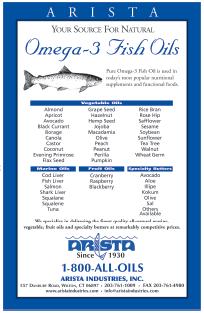
Be sure you have the funds to pursue this crucial aspect of branding and sales before delving into a private label launch. Levine says, “The biggest mistake retailers make is not allocating adequate capital to create their own line. Any introduction of a line needs to be accompanied by adequate fanfare. The typical presentations ought to be pushed repeatedly over several months: tastings, sampling, banners and introductory sales. The entire arsenal needs to be utilized.”
Retailers should also utilize the Internet and social media; they are great platforms with which to launch or promote your private label line. Shriver advises that retailers also cross-promote other store brand products on packaging and online when space permits. It is a great way to let customers know a new product is available. This is a simple concept, but easily overlooked: “Your customers can’t buy it from you if they don’t know you offer it,” he states.
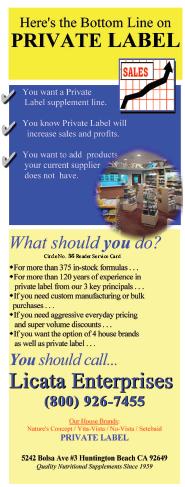
Additionally, quality assurance should be a key part of your brand. Halpert says, “If the product requires any kind of over-the-counter compliance, stability testing, organic certification or export documentation, then the retailer must make this allowance in establishing lead times and development budgets. This is especially critical when a new line has a deadline that must be met. A minimum of six months is usually required, although some [of our] customers allow up to 12–18 months for this process.”
In this climate, it is even more important not to pick just any private labeler. A dangerous trap for retailers to fall into is to look for the lowest cost products they can find without consideration for performance differences and quality. For example, says Connie Falkenstein, R.D., M.S., MPH, director of marketing and education for UAS Laboratories, Inc., Minneapolis, MN, “With probiotics, there are huge differences in performance from one strain to another, so the lowest cost might not get the best results. Performance and quality should remain the highest priorities, and then the best cost.”
It also is important to work with a private label manufacturer that is compliant with federal good manufacturing practices (GMPs). Sokoloski says, “It’s essential that both the finished product and label copy are compliant with the law; once those are in place it’s much easier to bring a product line to market. A manufacturer with excellent customer service will make that process easier, and the more manufacturing experience they have, the more they can help [retailers] grow their businesses as needed.”
Additionally, some companies use third-party verification to ensure potency, purity and uniformity. Russell says, “After our manufacturing process, that mee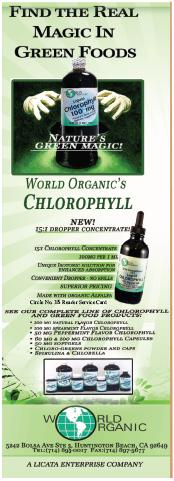 ts the model established by the U.S. Pharmacopeia, we third-party test all finished product and, when requested, will provide those independent assays.” This provides confidence to the retailer and to the consumer.
ts the model established by the U.S. Pharmacopeia, we third-party test all finished product and, when requested, will provide those independent assays.” This provides confidence to the retailer and to the consumer.
Many private label manufacturers are also selective about with whom they choose to do business. UAS Laboratories will only work with “quality-conscious companies,” so even as a retailer, present your company as being quality-minded and responsible.
Shriver says, “Although retailers are looking for value in their private label, they should never sacrifice quality. Private label is just a piece of overall business; so don’t denigrate the store’s image by putting your logo on lower-quality goods. In short, even with private label, make sure you are meeting or exceeding the expectation of the consumer.”
C: Creativity
Lack of innovation can be a retailer’s biggest downfall—launching a product that does not have a national brand equivalent can be risky, but also lead to great success. When looking for a manufacturer, choose one that is “innovative and can bring to the table products with credible claims and exceptional
performance at a price that supports the price/value proposition,” says Betz.
Retailers have a unique knowledge of customers’ needs because of their constant close contact. Use this to your advantage to respond to what customers are buying and for what they are asking. Frequently reevaluating your product offerings can be the difference between failure and success. Sure, your private label line was great when you started 10 years ago, but is it still today? Formulation, delivery and research advances make it imperative that you are constantly evaluating what is on your shelves. According to Russell, a great line will “not only hold prime real estate in the store, it is well maintained, rarely out of stock on items, and always has the most cutting-edge supplements.”
|
Select Private Label Manufacturers ADH Health Products, Inc. (Congers, NY) provides complete research and product development services as well as stock items of private label items and the company’s in-house label, including capsules, tablets, powders and liquids. |
Khalid adds, “Innovation in new ingredients, new delivery systems and packaging continue to drive the growth of the industry. Private label products can launch innovative products instead of ‘me-too’ versions to compete with major brands.”
Other innovations may include new sunscreen technologies in HBC lines, availability of new organic ingredients, greener formulations of established products, developments in sustainable packaging and fair trade ingredient sourcing, says Halpert. “Effecting progressive changes to a product line can give new life to a line that has been sitting on the shelf year after year,” adds Halpert.
Feeling nervous about trying out a new product idea? Many manufacturers offering small-batches or pilot runs to test out how a product will fare in your store. Shriver says, “Trial! Trial! Trial! It’s been proven time and again that consumer trial drives purchasing.”
According to Russell, Reliance Private Label will ship product in minimums of threes and sixes, to allow for better inventory control and the opportunity to see how products will sell.
Smaller-sized ordering is a trend that is definitely taking off. One company, Nutricap Labs, based in Farmingdale, NY, recently launched a separate division, Vitacap Labs, to handle small quantity orders for those on a limited budget or for those trying out a product for the first time.
Extra Credit
Don’t let the fact that you stock a particular brand that also provides private labeling, deter you from pursuing your goal of creating a line. Kohli says, “As a vertical manufacturer, if a customer chooses our national brand or our manufactured private label, we still win. But most important, we feel the consumer wins.”
Private label manufacturers are okay with this dynamic of “competition.” Shriver says, “I would much rather cannibalize my own brand, than have someone else do it.”
More importantly, Russell advises, “The first question that should always be asked when being presented with a new product is, ‘Will this product take away sales from our brand?’ Remember, the goal is [for retailers] to build their business not another’s, and to generate repeat customers for what can be found only in their store.”
In fact, says Khalid, the brand equity of the company next to your product will have a “halo-effect” on the private label product, increasing trust in the consumer’s mind. And trust certainly is a key part of what makes private labeling successful.
Gerard E. Mullin, M.D., at a presentation at this year’s Natural MarketPlace tradeshow, noted how clinical research should be used as a tool to boost consumer confidence in products and that this can specifically apply to private label products. He stated that 64% believe that clinical research affects their belief in supplement claims (1). Work with your manufacturer to create formulations with ingredients backed by clinical research—and then let your customers know about it! Make sure labeling and store signage showcase clinical information about a product’s formulation.
The key is to make your brand the “go-to” products, rather than the “bait-and-switch” brand, says Russell.
An important part of creating this trust also lies in employees. Sokoloski states, “Employees need to know that it’s not just another brand, but it represents the values and philosophy of their company. It needs to be offered as the #1 brand since it offers long-term growth and advertises their business.”
Manufacturers are making it easier than ever to create a unique private label line based on trust and quality. Russell says, “All there needs to be from the retailer’s end is a strong commitment to build brand equity for their supplements and for their business.” WF
Reference
1. Gerard E. Mullin, “The Inside Tract to Digestive Health,” presented at Natural MarketPlace 2010, Las Vegas, NV, June 11–12, 2010.
Published in WholeFoods Magazine, Aug. 2010


